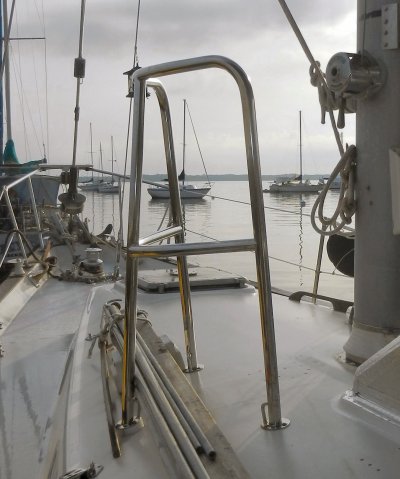MAST
PULPITS
©
2014 Tor Pinney - All Rights Reserved
Working at the mast in
rough weather can be difficult and dangerous.
Mast pulpits make it a lot easier and a whole lot safer.
Anyone who has stood working
at the mainmast aboard a sailboat underway in heavy weather
knows how awkward, even dangerous, it can be, juggling a
halyard, reef cringle & lines and a winch handle while
simultaneously hanging on for dear life. Working the starboard
side, where the main halyard usually secures, with the boat on a
port tack puts you on the "downhill" slope with nothing between
you and overboard but thin air. Of course, any sane sailor will
clip their safety harness to the mast in such conditions, but
you can still be thrown around and possibly injured.
Now, compare that scenario to
having a stout, broad railing braced against your back, one you
can lean into with complete confidence so both your hands are
free to work. The macho lubber who nick-named these rails
"chicken bars" had obviously never sailed offshore.
 |
I'm talking about mast
pulpits, standing stainless steel rails mounted either side
of the mainmast. With the possible exception of vessels
whose halyards and reef lines are led aft to the cockpit,
any sailboat that ventures out upon unprotected waters
should have these live-savers. While there are some
one-size-fits-all rails advertised, mast pulpits must
generally be fabricated (or modified) to fit the individual
boat's coachhouse camber. Price, quality, design and
dimensions can vary widely. It pays to query several metal
fabrication shops and welders who can show you examples of
mast pulpits they've made for others. If your boat is a
production model, an online owners' group may be able to
direct you to a fabricator who already has her mast pulpit
plans. A boat with a roller furling genoa halyard
permanently secured on the port side of the mast (and no
staysail halyard to work) might get by with just one,
starboard mast pulpit. |
~
End ~
Back to Cruising Tips